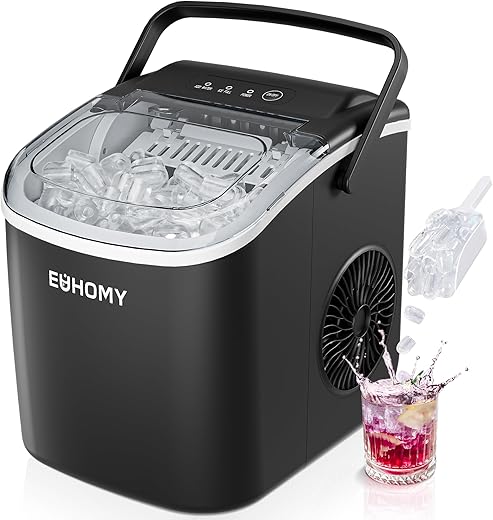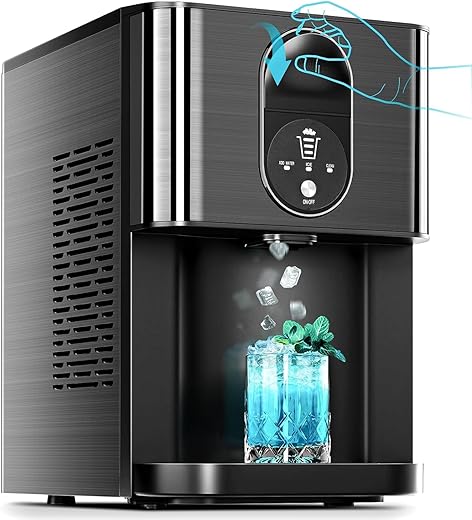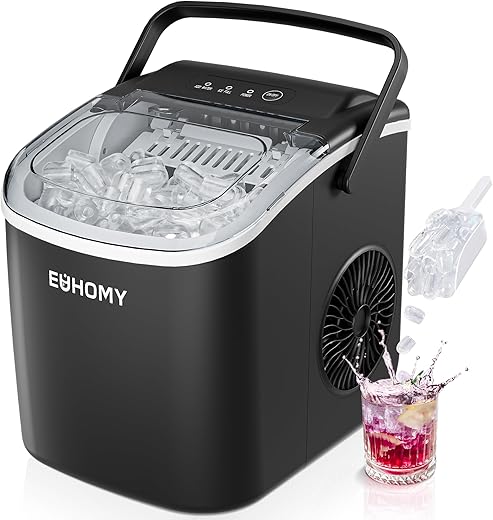This step-by-step guide outlines essential upgrades for enhancing the efficiency of your compact ice machine, crucial for both residential and commercial use. It addresses common performance issues that can arise over time and provides actionable solutions to optimize your ice production. By following the outlined steps, you can improve energy consumption, extend the lifespan of your appliance, and ensure a reliable supply of ice, ultimately maximizing your investment.
Top Portable Ice Makers of 2024: Watch This Before You Buy!
Assess Your Current Ice Machine
Evaluate the performance of your current compact ice machine. Observe how quickly it produces ice; if it takes longer than usual, note this as a potential issue. Listen for unusual noises during operation, such as grinding or rattling, which may indicate mechanical problems. Monitor the energy consumption by checking your electricity bill; if you notice a significant increase, this could signal that your machine is inefficient. Document these observations, as they will help you pinpoint areas that require improvement. For example, if your ice machine is producing less than half of its rated capacity, this is a clear sign that something is wrong and needs addressing.
Clean the Ice Machine
Empty the ice bin completely, ensuring no leftover ice remains. Remove any ice buildup from the evaporator plate and other surfaces using a plastic scraper to avoid damaging the machine. Clean the interior and exterior surfaces with a mixture of equal parts water and vinegar, applying the solution with a soft cloth or sponge. Rinse thoroughly with clean water to remove any residue, and then wipe down with a dry cloth to ensure all areas are free of moisture. Repeat this process regularly, ideally every six months, to prevent mineral deposits and bacteria buildup, which can compromise the machine’s efficiency and ice quality.
Check and Replace Filters
Inspect the water and air filters of your ice machine regularly. Examine the filters for any signs of clogging or dirt buildup. If you find them dirty or obstructed, promptly replace them to maintain optimal airflow and water quality. Clean filters can significantly enhance your machine’s efficiency, ensuring consistent ice production and better overall performance.
Upgrade to Energy-Efficient Components
Upgrade the compressor and condenser in your ice-making unit to more energy-efficient models. Research and select components that are rated for higher energy efficiency, often indicated by ENERGY STAR certification. Remove the existing compressor and condenser carefully, ensuring all connections are properly disconnected. Install the new components following the manufacturer’s guidelines, and check for any leaks or issues before starting the unit. Expect reduced energy consumption, faster ice production, and ultimately lower operational costs.
Optimize Water Supply
- Ensure your compact ice machine is connected to a clean, filtered water supply.
- Inspect the water line for any signs of contamination or build-up that could affect ice quality.
- Install a water filtration system if necessary, choosing one that is compatible with your ice machine.
- Replace filters regularly based on manufacturer recommendations to maintain optimal water quality and efficiency.
- Monitor the ice production and quality, adjusting the filtration settings as needed to achieve the best results.
Adjust Temperature Settings
Check the temperature settings of your ice machine. Locate the control panel and refer to the manufacturer’s manual for the recommended temperature range, usually between 0°F and 5°F (-18°C to -15°C). Adjust the thermostat accordingly using the temperature dial or digital display, ensuring it aligns with the specified range. Monitor the ice production for a few hours to verify optimal performance—if ice production is low, consider lowering the temperature slightly to enhance efficiency.
Insulate Your Ice Machine
Inspect the insulation around your ice machine thoroughly, focusing on seams and joints where heat loss is most likely to occur. Feel for any gaps or areas where the insulation appears compressed or damaged, as these can significantly reduce efficiency. If you identify insufficient insulation, wrap additional insulation material, such as foam board or reflective insulation, around the unit, ensuring it’s snug but not too tight to avoid restricting airflow. Use weather stripping or sealant to fill any gaps around pipes or connections leading to the machine, effectively minimizing heat transfer and enhancing the ice machine’s performance, especially if it’s situated in a warm environment like a kitchen or outdoor bar area.
Regular Maintenance Schedule
Establish a regular maintenance schedule to keep your compact ice machine in optimal condition. Follow these steps for effective upkeep:
- Perform routine cleaning every month. Remove any ice buildup and clean the interior surfaces with a mild detergent to prevent mold and odors.
- Change filters every three months or as needed. Check the manufacturer’s guidelines for specific recommendations and replace filters to maintain water quality and machine efficiency.
- Conduct performance checks quarterly. Monitor ice production rates and inspect for unusual noises or leaks. Address any issues immediately to avoid further damage.
- Check water supply connections regularly. Ensure all hoses and fittings are secure and free from leaks to maintain consistent water flow to the machine.
Monitor Performance After Upgrades
Monitor the performance of your ice machine closely over the following weeks after upgrades. Record the quantity of ice produced daily and compare it with previous outputs to assess improvements. Track energy consumption by checking the meter readings regularly, noting any changes in usage patterns. Remain vigilant for any new issues, such as unusual noises or inconsistent ice quality, and document these observations for future reference.
Maximizing Performance and Longevity
In conclusion, upgrading your compact ice machine can significantly boost its efficiency and reliability. By implementing the steps outlined in this guide, you’ll not only ensure a consistent supply of ice but also save on operating costs. Remember, regular maintenance is key to long-term performance, so stay proactive and attentive to your machine’s needs. With these improvements, you can enjoy a more efficient and cost-effective ice solution for your home or business.













I’m really bad at keeping up with the maintenance schedule. What’s the best way to remind myself to check on my ice machine? Any apps or tips for setting reminders?
Great question! You can set recurring reminders on your phone or use apps like Todoist to help keep you on track. A little consistency goes a long way!
I’ve been struggling with my Scotsman ice machine lately. After cleaning and replacing the filters, it still seems sluggish. Any troubleshooting tips? Maybe I’m missing something!
Hey there! It can be tricky sometimes. Make sure to check if the water supply isn’t restricted and that the machine is leveled properly. Sometimes, it’s just a little thing that makes a big difference!
Any advanced tips for really squeezing out more efficiency? I’ve done the basics, but I feel like I can do more. What do you suggest?
Consider investing in a smart controller that can adjust based on ambient conditions. It’s a bit pricier but can pay off in the long run by optimizing performance automatically!
For monitoring performance, I hooked up a simple energy monitor to my ice machine. I can see real-time usage and it helps me adjust settings as needed. Highly recommend trying this out!
That’s an awesome idea! Real-time data can really help in making adjustments and saving costs. Thanks for sharing!
Upgrading to energy-efficient components is a great point! I installed a new compressor from Copeland, and my energy bills dropped significantly. Anyone else see similar results?
For adjusting temperature settings, I went a bit rogue and lowered mine more than recommended, and it turned out fine. My ice production went up, but I’m curious if anyone else has tried this or faced issues?
That’s interesting! While it worked for you, just keep an eye on the overall efficiency. Sometimes, going too low can lead to other issues like longer freeze times.
I found that cleaning my Manitowoc ice machine really boosted its performance. I used a mixture of vinegar and water, and wow, the difference was noticeable! Anyone else try this method? What worked for you?
Optimizing the water supply is key! I found that using a water softener with my Hoshizaki ice machine really helped reduce scale buildup. It’s made my ice taste way better too!
Insulating my ice machine was a game changer! I used foam board insulation from Home Depot, and it really helped with efficiency. Anyone got other materials they’ve used that worked just as well?